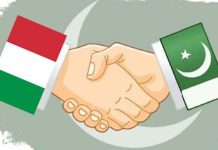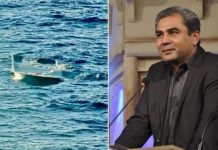ISLAMABAD, AUG 17 /DNA/ – “From Pakistan’s perspective, the Conference on Disarmament (CD) does not operate in isolation. It is affected by the geopolitical developments at the national and international levels, policy choices of major powers and how the CD members perceive these developments impacting their national security.” This was said by Ambassador Khalil Hashmi, Permanent Representative of Pakistan to UN, Genevaat thewebtalk on “Issues and Debate at the Conference on Disarmament (CD): A View from Pakistan.” The webtalk wasorganised by the Arms Control and Disarmament Centre (ACDC) at the Institute of Strategic Studies Islamabad (ISSI) on August 17, 2021. Various distinguished national and international experts attended the webtalk. Ambassador Aizaz Ahmad Chaudhry, Director-General ISSI welcomed the participants.
Ambassador Hashmi pointed out the CD’s membership and its composition of militarily significant countries, the rules of procedures and mechanisms,the agenda of achieving nuclear disarmament and absence of civil society’s participation are major and constant internal variables that affect CD’s working. There are ongoing debates regarding further extension of membership, revision of agenda and amendment of rules and procedures. Numerous proposalshad been tabled but they did not get much attention, he said. While underlining the external variables, he said that the primary rationale behind CD was to negotiate the treaty of nuclear disarmament, however, the indefinite extension of the NPT somehow legitimised the possession of nuclear weapons and sowed the seeds of existing stalemate at the CD. Other variables are the longstanding and well-founded frustration due to non-compliance of legal obligations, lack of forwarding movement on the issue of Negative Security Assurances (NSA), deliberate disregard for established norms of global arms control and disarmament regime, growing mistrust among member states and contest for prioritising the issues among major powers.
While highlighting the prospects, he opined that the progress at CD in terms of negotiating any treaty is difficult to achieve due to renewed global arms race, doctrinal shifts and growing competition and antagonism among major powers. Therefore, there is a need to reverse the policies that caused the stalemate and revive the old global consensus on the issue of nuclear disarmament. He also drew attention to theintegration of AI with existing weapons, nanotechnologies, synthetic material, militarisation of cyberspace, hypersonic missile race as matters of serious concern, whichmust be brought to the CD agenda. However, there is little appetite among major powers to bring them to the agenda. “Currently, there are no clear solutions and the global landscape for arms control and disarmament is not bright,” he said.
Earlier in his introductory remarks, Malik Qasim Mustafa,Director ACDC-ISSI, said thatthe CD succeeded in negotiating the NPT, CWC, BWC and CTBT, however, the Conference is facing deadlock for more than two decades for not reaching a consensus on its programme of work. The new nuclear arms race, the demise of arms control treaties and agreements, military modernisation and weaponisation of outer space, militarisation of emerging technologies and new emerging realities are going to impact this impasse at the CD. He said that the CD should adopt a comprehensive, objective and rule-based approach to break the deadlock and deal with the existing and emerging challenges.
In her remarks, Ambassador Tehmina Janjua, former Foreign Secretary of Pakistan, said that CD should notbe seen as ineffective and irrelevant. The CD is a forum where Pakistan’s views are sought, heard, understood and greatly valued. It is an important strategic forum where Pakistan can bring to attention the security challenges it is facing in the region because of the special treatment given to India. Pakistan is focused on NSA and PAROS but the western countries view the non-proliferation and FMCT as the only negotiable issues, she said.
The Webtalk was followed by an extensivequestion and answer session.
In his concluding remarks, Ambassador Khalid Mahmood, Chairman BoG ISSI, said that CD made major progress when conditions were rights but from the last two decades, it is in a stalemate. However, the CD remains an important multilateral body as it could play a greater role in dealing with the challenge of emerging technologies.

















